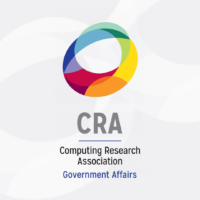CRA Launches 2024-2025 Quadrennial Paper Series as New Administration Takes Office
By Matt Hazenbush, Director of Communications
As the new administration prepares to take office later this month, the Computing Research Association (CRA) is excited to announce the first tranche of papers in its 2024-2025 CRA Quadrennial Paper Series. This community-driven initiative brings together leading experts to explore pressing challenges and emerging opportunities in computing research. The Quadrennial Papers aim to inform policymakers, researchers, and the public about key issues in the field and offer actionable recommendations aligned with national priorities.
This release includes six papers, each delving into a critical topic with significant societal, economic, and technological implications. Additional papers will be released in the coming weeks and months.
Reclaiming the Future: American Information Technology Leadership in an Era of Global Competition
Authors: Alex Aiken (Stanford University), David Jensen (University of Massachusetts Amherst), Catherine Gill (CRA), William Gropp (University of Illinois Urbana-Champaign), Peter Harsha (CRA), Brian Mosley (CRA), Daniel Reed (University of Utah), William Regli (University of Maryland)
The United States risks losing global leadership in information technology due to declining research investment, challenges in attracting talent, and tensions between security and openness. This paper advocates for increased funding, streamlined immigration policies, and a commitment to research openness to sustain innovation and competitiveness.
Imperative for Educating the Next Generation Robotics Technology Workforce
Authors: Holly Yanco (University of Massachusetts Lowell), Odest Chadwicke Jenkins (University of Michigan), Weisong Shi (University of Delaware), William Regli (University of Maryland), Monica Anderson Herzog (University of Alabama)
The United States must urgently develop educational and career pathways in robotics — from K-12 through professional development — to build a skilled workforce capable of leading innovation and maintaining competitiveness. This paper highlights the need to integrate robotics education into K-12 curricula, establish national training centers, and foster public-private partnerships to ensure U.S. leadership in robotics and automation.
Lessons for Cybersecurity from the American Public Health System
Authors: Adam Shostack (University of Washington), L. Jean Camp (Indiana University), Yi Ting Chua (University of Tulsa), Josiah Dykstra (Trail of Bits), Brian LaMacchia (FARCASTER Consulting Group), Daniel Lopresti (Lehigh University)
The United States needs national institutions and frameworks to systematically collect cybersecurity data, measure outcomes, and coordinate responses across government and private sectors, akin to how public health systems address disease outbreaks. This paper proposes adopting public health principles in cybersecurity, emphasizing systematic approaches to improve resilience and readiness. It highlights the importance of data collection, outcome measurement, and coordinated responses to strengthen national cybersecurity efforts.
The Post-Quantum Cryptography Transition: Making Progress, But Still a Long Road Ahead
Authors: Brian LaMacchia (Farcaster Consulting Group), Matt Campagna (Amazon Web Services), William Gropp (University of Illinois Urbana-Champaign)
The development of quantum computing poses a significant threat to the security of widely deployed cryptographic algorithms. This paper highlights the progress in post-quantum cryptography (PQC) standardization while emphasizing the challenges ahead. With an estimated $7.1 billion transition cost for non-National Security Systems and an aggressive 2035 deadline, the paper underscores the urgent need for sustained funding, research, and international coordination to secure critical infrastructure and successfully upgrade existing cryptographic systems.
Prioritizing Computing Research to Empower and Protect Vulnerable Populations
Authors: Pamela Wisniewski (Vanderbilt University), Katie Siek (Indiana University Bloomington), Kevin Butler (University of Florida), Gabrielle Allen (University of Wyoming), Weisong Shi (University of Delaware), Manish Parashar (University of Utah), Haley Griffin (CRA)
Technology can pose significant risks to vulnerable populations, but it also holds transformative potential. This paper examines the ethical challenges and opportunities in designing, researching, and deploying technology to serve underserved communities. It provides recommendations for creating inclusive, ethical, and sustainable systems that empower and protect vulnerable populations, fostering a society where everyone benefits, including the most at-risk individuals.
Setting a Course for Post-Moore Software Performance
Authors: William Gropp (University of Illinois Urbana-Champaign), Randal Burns (Johns Hopkins University), Brian LaMacchia (Farcaster Consulting Group), Charles E. Leiserson (MIT), Michela Taufer (University of Tennessee, Knoxville)
With Moore’s Law no longer driving hardware improvements, the U.S. must prioritize software performance engineering (SPE) to optimize computing capabilities and maintain its technological edge. This paper underscores the need for significant investment in SPE research, education, and workforce training, as few software engineers currently possess these critical skills.
Addressing Pressing Challenges and Emerging Opportunities in Computing Research
The CRA Quadrennial Papers highlight the computing research community’s collective insights into areas of national importance. With additional papers expected soon, this series will continue to serve as a vital resource for understanding the potential of computing research to address critical societal challenges.
For more information and to explore the full series, visit CRA’s Quadrennial Papers webpage.









